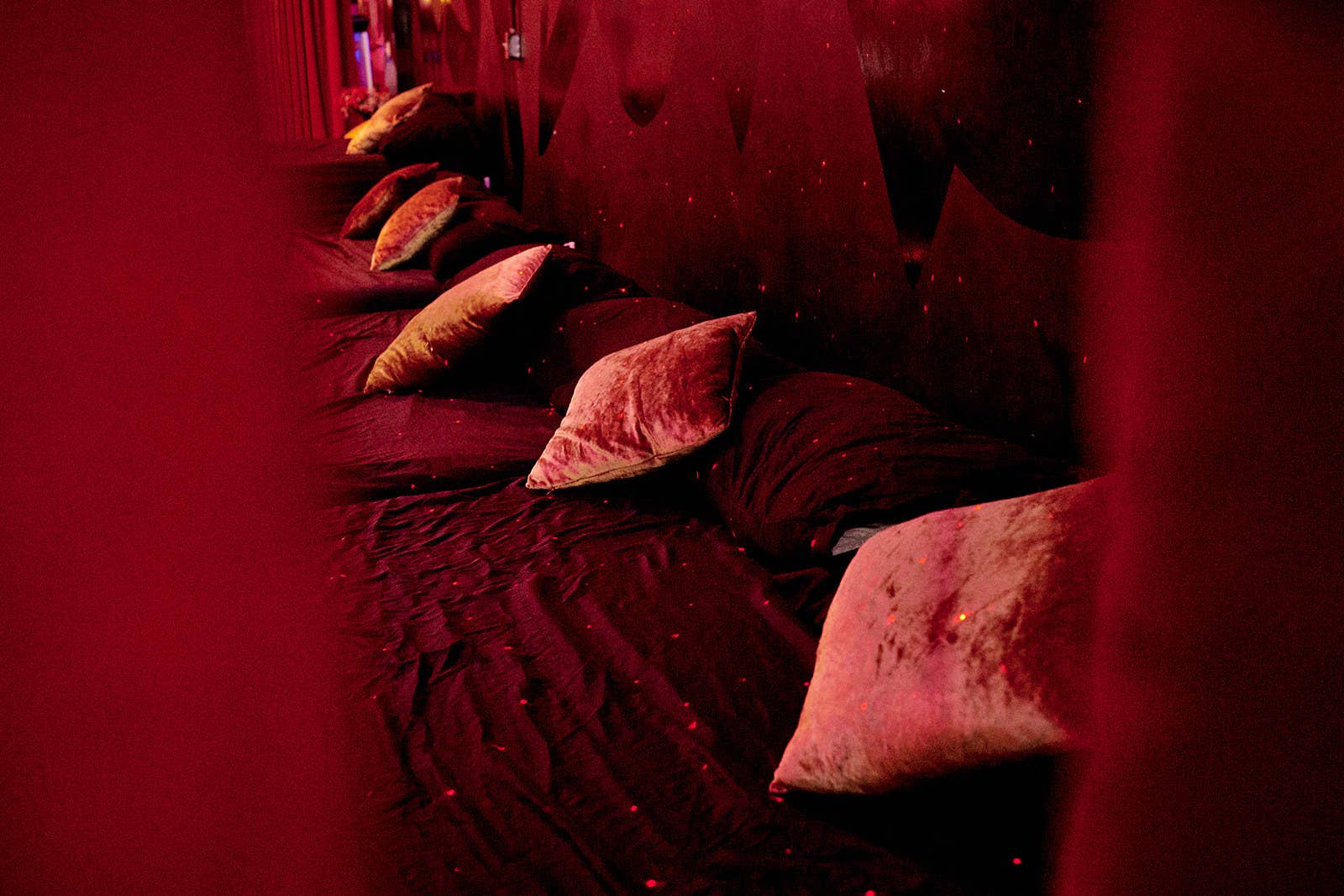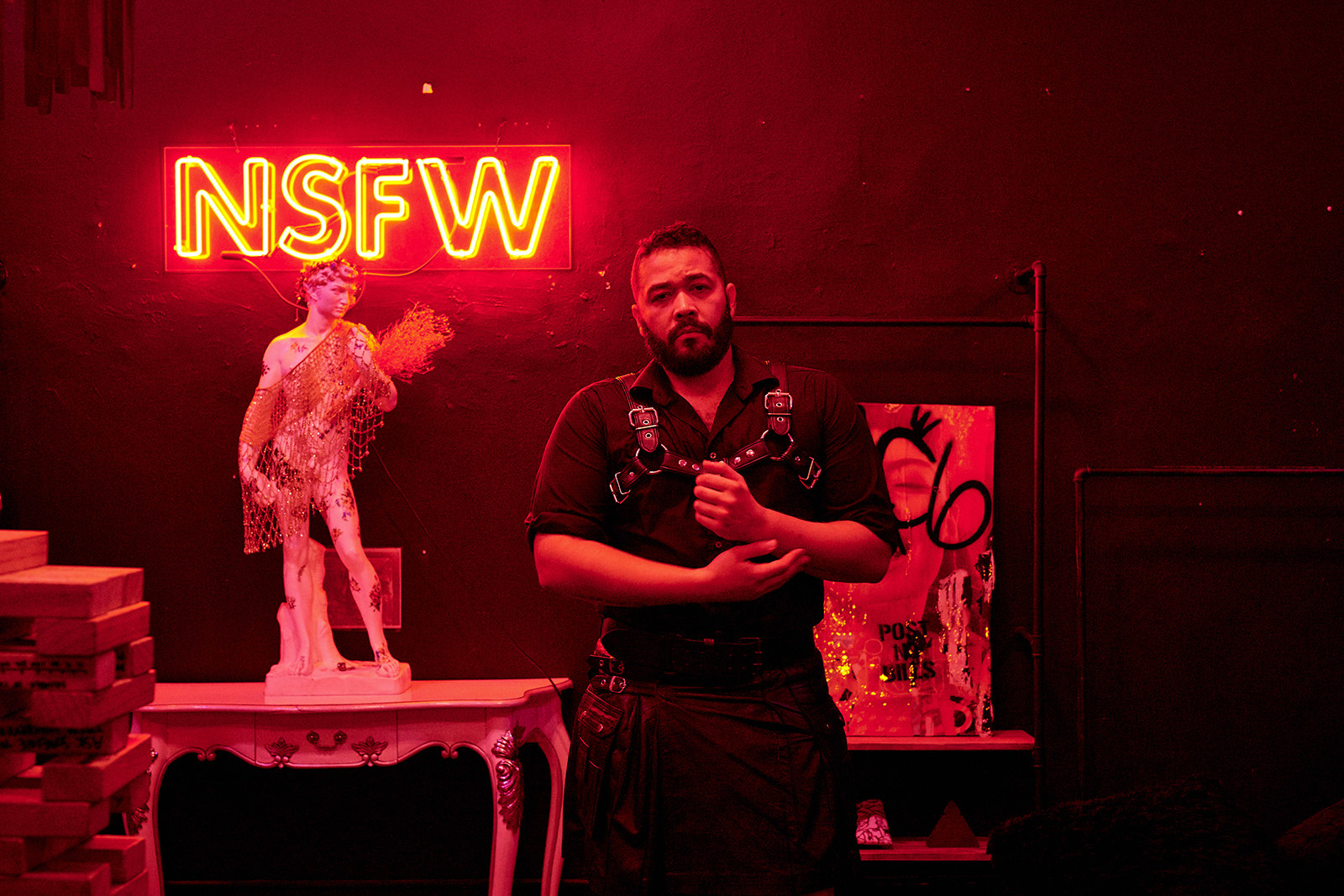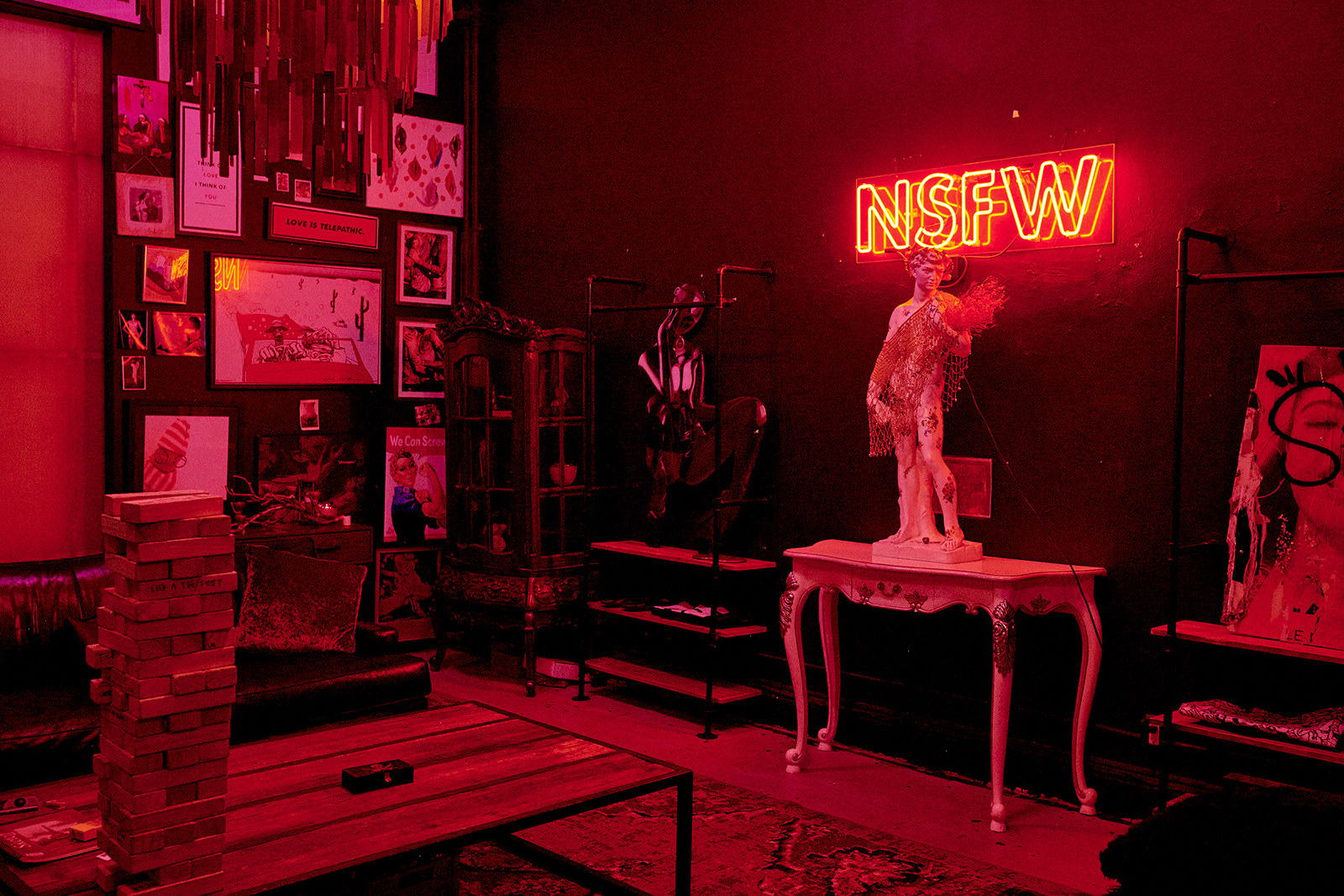
Monkeypox cases were rising in New York City, and Billy Procida, a 33-year-old comedian and podcaster in Brooklyn, had to make a decision: fool around at an inclusive sex party at Hacienda or abstain from sex?
At the queer-friendly group sex parties Procida attends, men who have sex with men and women who have sex with queer men abound. “Because of the communities I’m a part of and the type of sex I enjoy having, I want to be more active in protecting myself,” Procida said. Two days earlier, gay sex columnist Dan Savage had released a bonus episode of his podcast urging listeners to temporarily be less slutty after the WHO said that gay men should cut back on new partners to stop the spread of the disease.
“If Dan is telling me, pull my pants up for three weeks, I’m gonna rethink some things,” Procida said. After much dithering, he went to the party, but with a caveat: He wouldn’t have sex. Instead, he put on a sex-themed T-shirt and jock strap and spent the night working at the club bar. As he was bartending, a shirtless friend approached and gave him a hug. “Before I could verbalize the I’m-not-hugging-tonight thing, I’m doing a hug and I’m like, Oh gosh, I hope there’s no sores on his back,” Procida said.
Hacienda created a monkeypox policy after members expressed concern. Beth Sparksfire, cofounder and director of events, said the club is changing sheets more frequently, providing disinfecting wipes, and offering refunds to anyone who feels sick and needs to stay home.
Procida, who identifies as straight, often attends sex parties. Yet he is not in the high-risk category for monkeypox, according to most health departments, which recommend limiting the vaccine to “gay, bisexual, or other man who has sex with men, and/or transgender, gender non-conforming, or gender non-binary” and “have had multiple or anonymous sex partners in the last 14 days” or “have had skin-to-skin contact with someone in a social network experiencing monkeypox activity” (NYC) or “people who have been identified by known cases as intimate or otherwise close contacts of a person diagnosed with monkeypox” (San Diego). However, Procida and others who have multiple sex partners, such as sex workers, believe they too should be eligible for the monkeypox vaccine.
Vaccines are distributed by county and city health departments, which are supposed to use the voluntary CDC guidelines to direct their decisions about vaccine eligibility. The CDC’s website recommends vaccination for “people who had multiple sexual partners in the past 2 weeks in an area with known monkeypox,” people who have had contact with someone with monkeypox, and people whose sexual partners have the virus. But many departments only offer the vaccine to gay, trans, and bisexual men who have had sex with multiple men in the past 14 days and people who have had contact with someone diagnosed with monkeypox.
A few jurisdictions do offer vaccines to sex workers and people who attend sex clubs. Virginia, Michigan, Washington, DC, and Wyoming allow sex workers of any gender and sex-club attendees to get the vaccine. Palm Springs, California; Philadelphia, and New Orleans allow sex workers to get it, as does Sacramento, if they have engaged in sex work in the past three weeks. The city of San Francisco says “sex workers of any sexual orientation or gender identity” are eligible.
“We’re messaging to everybody that this is a disease that’s transmitted through skin-to-skin contact that can include … sexual contact.”
Dr. John T. Brooks, the chief medical officer of the CDC’s Monkeypox Response Team, said there’s a good reason for rationing the vaccine: There’s just not enough of it, because one variety, the Jynneos vaccine, is only produced in one factory in Denmark. Vaccine scarcity means that the supply needs “to go where the disease is occurring,” Brooks said. The most recent CDC data shows that 99% of recorded infections are among men, and that 94% of those men have had sexual contact with men over the past three weeks. “So that’s why we’re targeting men who have sex with men now, but we’re messaging to everybody that this is a disease that’s transmitted through skin-to-skin contact that can include … sexual contact.”
Monkeypox is not a sexually transmitted disease, though, according to Brooks. Rather, it is sexually transmissible, which means that it can be spread through sex, but also in other ways. Sexual transmission was not how monkeypox used to spread, according to Dr. Margaret Ann Harris, a spokesperson for WHO. “For many years, monkeypox was associated with activities related to contact with wild game,” she wrote via email.

A few weeks ago, Zachary Zane, a sex and relationships writer who runs a Brooklyn-based sex party called BISLUT for bisexual men and “their admirers,” began considering shutting his events down. In July, Zane stopped attending other sex parties out of fear of the virus. He thought BISLUT might be a particularly risky party because it caters to bisexual men, who are at higher risk for monkeypox than straight men; it also brings these men together with women who are not in the high-risk group. The party could be a “bridge” between these communities, he surmised. So he canceled the party.
Brooks said that if clubs want to temporarily close, “I would certainly support them in that decision,” but the CDC doesn’t recommend shutting down “because we just know that doesn’t help interrupt transmission.” During the HIV epidemic, for example, closing bathhouses and clubs only led people to meet elsewhere. “People will find other places to have sex and all of us exist because of someone having sex,” he said. He insisted that the CDC is “very sex positive. We want you to have sex but have it safely so you're protected and other people are protected.”
He suggested that people should “cut back on the number of anonymous sexual partners,” and have virtual sex parties. “You can have some pretty hot masturbation if you know how to do it,” he said. And if you do have anonymous partners, “consider having sex with your fetish clothing on. Latex and leather gear can be pretty hot for some people, and it can help also cover up a lot of your body so you reduce those areas of getting exposed,” he said — just wash the clothes properly afterward. It’s also important to get partners’ contact information so the CDC can trace contacts whenever transmission occurs. Contact tracing was “fundamental to controlling smallpox … and this is another pox disease — we could use that same strategy,” Brooks said.
But vaccines were also key to controlling smallpox, and many potentially at-risk people want to get vaccinated against monkeypox. When the monkeypox vaccine became available in New York City, Zane immediately tried to make an appointment.
“I refreshed the page on the New York State Department of Health about 600 times because at every step it would keep crashing,” he said. He eventually got his first shot. But he doesn’t expect to return to the party scene immediately, even after he is fully vaccinated.
Zane is considering restarting the BISLUT parties once anybody can get the vaccine. But in several cities, including New York, sex clubs and parties are still doing business. Zane thinks he may know why: Among party hosts and club owners, there seems to be a sense of, “Next month, it’s gonna be elephant pox, and we’re gonna have to shut down… eventually you got to keep open and do it,” he said. Most of Zane’s income does not come from parties, so he can afford to shut down; others depend on the income to live.

In late July, Daniel Saynt, who runs NSFW, a New York City sex club, saw that nearly 1,000 people in the city had contracted monkeypox, and he became concerned. NSFW informed members about monkeypox and vaccination resources, but vaccines were scarce and appointments weren’t guaranteed. “We started canceling our all-male events,” Saynt said.
He worried about his employees contracting the virus as well, even though they weren’t sexually active at the club. “It’s not just an STD — it’s something you can get from just handling sheets. [Employees] need to get vaccinated and protect themselves,” he said.
In New York City, the vaccine is still only available to gay and bisexual men who have had multiple sexual partners, leaving the rest of Saynt’s staff to try to convince clinics to give them the vaccine. He told employees to let the clinic know that they worked in a high-risk environment, and he said some of them have recently been able to get the vaccine.
Still, Saynt and his leadership team decided to shut down the club’s mixed-gender events too in late July.
“The lack of action [among other sex parties] has been a little concerning … I think we’re the only sex party that’s male and female that’s shut down in the city,” he said.

Having already suffered financially from halting parties during COVID, Saynt understands that clubs need to make money. He estimates his company has lost $60,000 in the past few weeks.
After a two-week closure, Saynt restarted parties in early August. A number of members have received the first dose of the vaccine, which offers some protection. He has been informing members that going to the club is a high-risk activity while also telling them that if they feel sick they shouldn’t show up. “I’m doubtful that anyone’s going to knowingly have monkeypox and try to come in,” Saynt said. Over the course of the pandemic, he said, the club has done contact tracing and provided members with information about COVID. “We didn’t have one infection,” he said. “COVID prepared us to do this right.”

In the porn industry, concern about monkeypox arose months ago. Ian O’Brien, executive director of PASS, a nonprofit organization that provides health screenings for porn workers, first saw reports saying there was a 10% fatality rate. “I was really terrified for the world,” he said. After reaching out to an expert at the University of California, Los Angeles, he discovered this statistic was on the higher end of a range, but he remained concerned. “We put out some information urging the industry to pay attention, to be cautious. We contacted our production contacts to say, ‘This is happening. We're monitoring it,’” O’Brien said.
“Abstinence means something radically different to somebody whose livelihood depends on sexual activity.”
When monkeypox became more prevalent, PASS started receiving more phone calls from studios. Production companies wanted to make sure they were doing everything they could on set to prevent transmission. But monkeypox represented a bigger challenge for the porn world than other diseases had. “Most of our strategy, as an industry, has been really reliant on screening and testing for infectious disease prior to folks being on set … this works really well for STIs,” O’Brien said. “Since PASS’ inception [in 2011], we’ve never had a single transmission of HIV on set.” The screening system even worked “pretty well for COVID, [but] we couldn’t use the same strategies for monkeypox because there is no screening test,” he said. “We debated if we should help with guidance around identifying potential lesions, but that felt a little bit like playing doctor and asking folks to be armchair dermatologists.” So PASS put out guidelines urging performers to not work if they “develop any sort of suspicious rash, lesions, or bumps, or ‘feel sick,’” to “clean and disinfect surfaces, bedding, and clothing,” and to try to get the vaccine.
“When the first guidelines came out, [the monkeypox vaccine] was available to gay men who have had rectal gonorrhea in the past three months [in LA],” O’Brien said. “I understand the risk evaluation there, but I don’t think pragmatically that’s how communities access things.” Additionally, porn performers couldn’t give up sex for a few weeks without taking a hit to their earnings. “Abstinence means something radically different to somebody whose livelihood depends on sexual activity. So we decided we wanted to do something,” O’Brien said.
A few weeks ago, vaccines became more widely available in Los Angeles, after the federal government identified the city as having a fairly large number of cases. O’Brien made it a priority “to get folks who we believe to be at risk as much as access as we can.” The director of PASS’ board, James Bell, is also a director of sexual health services for the LA LGBT Center, which had received a significant supply of the vaccine from the Los Angeles Department of Health. “Jamie and the folks at the LA LGBT Center really advocated for being able to put on a clinic for folks of all genders in sex work,” O’Brien said.
PASS held an event at the LA LGBT Center and filled up its 60 vaccination slots immediately. Porn performer Shawn Alff lined up to get his monkeypox jab at the clinic, even though his work involves women and the occasional threesome with bi men. “I’m not a super hypochondriac, especially with monkeypox,” Alff said. “But it would keep you out of work for at least a month. I was also planning on going to Burning Man.”
Alff said there is no longer a clear line between gay and straight performers in the industry.
“Female ‘straight’ performers are just as susceptible as male ‘gay’ performers [to monkeypox] … Almost every female performer that I work with also works with trans and gay and bi performers. So I just don’t see a divide, really,” he said.
So far, no performers have reported contracting monkeypox on set, although some performers do have it and are staying away from work, O’Brien said. Sex workers are unfairly “viewed as potential vectors of disease,” he added. Alff believes that’s because the porn industry is viewed as a scapegoat by society. “It kind of gives you this level of [psychological] protection, like, ‘Well, I’m not going to get it because the only people are getting it are these people who have this moral failing,’” Alff said. The upshot, he said, is that the porn industry has to “self-regulate to a higher degree than other industries.”
O’Brien also gives advice about monkeypox to full-service sex workers. Jessie Sage, a full-service sex worker based in Pittsburgh, told BuzzFeed News that it’s important for independent sex workers to have access to the vaccine. “When I was working in porn, if I was working with other performers, I could see when they were last tested on PASS, and I could access their health histories … When you’re doing full-service sex work, you can’t expect that of your clients,” she said.
Sage spent days trying to get the vaccine, a journey she chronicled for the Pittsburgh City Paper. First, she contacted an infectious disease doctor at a major hospital, who couldn’t help her. Sage then called the LGBT-friendly clinic that administers her PrEP, but they didn’t have the vaccine yet. When she finally found a clinic that did, she explained that she was a sex worker. An employee told her they weren’t allowed to give it to her because she wasn’t a man. So Sage called the Allegheny Department of Health, which also said she couldn’t get the jab. “What do I have to do to qualify? Like, besides being a professional whore?” she asked. The worker said she had to be gay, gender nonconforming, or trans; having sex with gay men did not suffice.
“There’s no time off for sex workers, or disability.”
Sage was frustrated. It didn’t make sense that these groups of people “would be higher risk for skin-to-skin contact infection than a sex worker,” she told me. If she were to get monkeypox, she would not only be sick, but she’d also take a financial hit. “There’s no time off for sex workers, or disability,” she said.
Brooks, the CDC monkeypox officer, defended the CDC guidance, which uses surveillance data on the prevalence of the disease in order to get the limited supply to the most affected groups. He acknowledged that other groups are affected. “We definitely have cases among women and we’ve had cases among children, but these are very few still… [But] if we see a bump in sex workers … we’re gonna have to pay attention to it,” Brooks said. However, according to WHO spokesperson Harris, women are also at risk, including “women who share a household with a person who has monkeypox, are partners of [men who have sex with men], or are female sex workers.”
A few days after Sage wrote her article, she was able to get the vaccine, as was another Pittsburgh-based sex worker, Elise (who requested a pseudonym to protect her privacy), who had also struggled to get it. Elise said she is not taking on new clients until the vaccine has fully kicked in. Her clients, however, are not concerned about monkeypox. “These men are part of society that thinks that [monkeypox] is completely removed from them,” she said.
People with multiple sex partners, including sex workers and sex party attendees, are continuing to seek and advocate for greater access to the monkeypox vaccine. But O’Brien cautions that sex workers should not be blamed for monkeypox. “This is a failure of government intervention and our communities to provide appropriate resources to take care of ourselves, not a failure of the industry or sex workers to operate responsibly,” O’Brien said. Some health departments are recognizing this, and WHO spokesperson Harris’s risk assessment indicates that sex workers could be more broadly considered a high-risk group.
Sage thinks that if she were to get monkeypox, the stigma attached to her work would lead people to blame her rather than the healthcare system. “I know a lot of people who are taking way bigger risks dating on Tinder than sex workers ever would,” she said. “It feels like a slap in the face to have to deal with all of this stigma and to actually be trying to be as responsible as possible, but then to be thwarted in such a direct and obvious way and have the government be like, ‘We’ve decided that we don’t care about you guys.’” ●
Correction: Billy Procida identifies a straight. A previous version of this post mischaracterized a comment from him as declining to state his sexual orientation.
